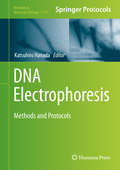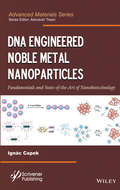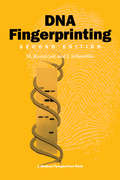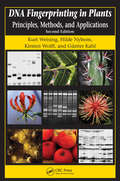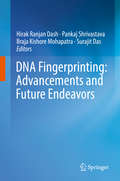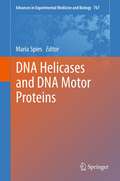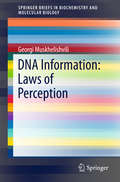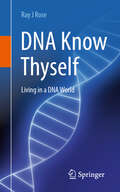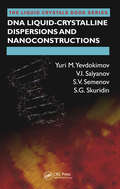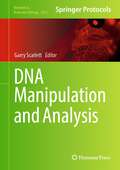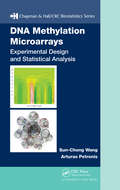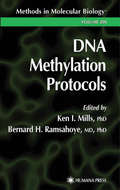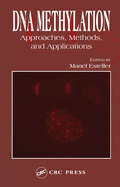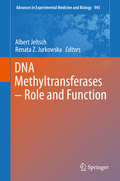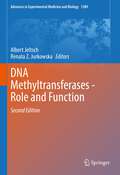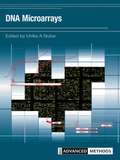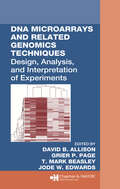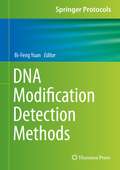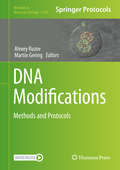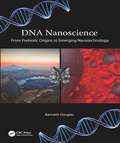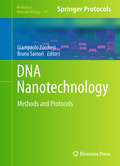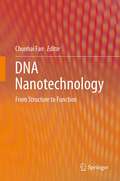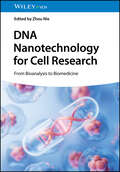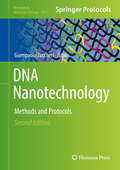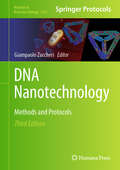- Table View
- List View
DNA Electrophoresis: Methods and Protocols (Methods in Molecular Biology #2119)
by Katsuhiro HanadaThis volume explores the latest techniques used by researchers to study DNA electrophoresis, with focus on various species including bacteria, yeasts, and mammalian cells. The chapters in this book cover topics such as two-dimensional gel electrophoresis; DNA replication; pulsed-field gel electrophoresis; ChIP; and post-labeling/PAGE method for detection of DNA adducts. Written in the highly successful Methods in Molecular Biology series format, chapters include introductions to their respective topics, lists of the necessary materials and reagents, step-by-step, readily reproducible laboratory protocols, and tips on troubleshooting and avoiding known pitfalls.Cutting-edge and authoritative, DNA Electrophoresis: Methods and Protocols is a valuable resource for any researchers looking to learn more about this developing field.
DNA Engineered Noble Metal Nanoparticles
by Ignác CapekThere is a growing interest in the use of nanoparticles modified with DNAs, viruses, peptides and proteins for the rational design of nanostructured functional materials and their use in biosensor applications. The challenge is to control the organization of biomolecules on nanoparticles while retaining their biological activity as potential chemical and gene therapeutics. These noble metal nanoparticles/biomolecules conjugates have specific properties and therefore they are attractive materials for nanotechnology in biochemistry and medicine. In this book, the author review work performed dealing with the DNA structure and functionalities, interactions between DNA, noble metal nanoparticles, surface active agents, solvents and other additives. Particular attention is given to how the DNA's chain length and the DNA conformation affect the interaction and structure of the nanoconjugates and nanostructures that are formed. Also discussed are the recent advances in the preparation, characterization, and applications of noble metal nanoparticles that are conjugated with DNA aptamers and oligomers. The advantages and disadvantages of functionalized nanoparticles through various detection modes are highlighted, including colorimetry, fluorescence, electrochemistry, SPR, and, mass spectrometry for the detection of small molecules and biomolecules. The functionalized noble metal nanoparticles are selective and sensitive for the analytes, showing their great potential in biosensing. Furthermore, this book reviews recent progress in the area of DNA-noble metal nanoparticles based artificial nanostructures, that is, the preparation, collective properties, and applications of various DNA-based nanostructures are also described.
DNA Fingerprinting
by M. Krawczak J. SchmidtkeThe book is primarily concerned with DNA fingerprinting and DNA profiling in the context of forensic medicine and kinship testing. It concentrates on methods of determining the degree of relatedness of members of the same species, focusing on humans and occasionally glancing at other species.
DNA Fingerprinting in Plants: Principles, Methods, and Applications, Second Edition
by Günter Kahl Kurt Weising Hilde Nybom Markus Pfenninger Kirsten WolffGiven the explosive development of new molecular marker techniques over the last decade, newcomers and experts alike in the field of DNA fingerprinting will find an easy-to-follow guide to the multitude of techniques available in DNA Fingerprinting in Plants: Principles, Methods, and Applications, Second Edition. Along with step-by-step annotated p
DNA Fingerprinting: Advancements and Future Endeavors
by Surajit Das Hirak Ranjan Dash Pankaj Shrivastava Braja Kishore MohapatraThis book describes the basics and various applications of DNA fingerprinting, including in actual case studies. The book is divided in four modules; Module 1: Basics of DNA Fingerprinting, Module 2: Applications of DNA Fingerprinting, Module 3: DNA Fingerprinting: Case Studies, and Module 4: Future of DNA Fingerprinting. Each module consists of 4 to 5 chapters, written by reputed researchers, academics and forensic scientists from around the globe. The respective chapters cover e.g. related fields, the tools and techniques used, various genotyping kits, real-world case studies, ancient DNA and wild life forensics, molecular diagnosis of human diseases, legal aspects, microbial forensics and the economics of the DNA fingerprinting technique. The book offers a practical guide for professionals, graduate and post-graduate students in the fields of Forensic Science, Medicine, Genetics, Anthropology, Microbiology, and Zoology. It also serves as a useful reference resource, summarizing major technological advances in the field of DNA fingerprinting, the problems faced in this field of science and possible new solutions to these problems. Presently, DNA fingerprinting is utilized in solving the majority of criminal cases; as such, the book is also helpful for investigating agencies, as it includes representative case studies.
DNA Helicases and DNA Motor Proteins (Advances in Experimental Medicine and Biology #767)
by Maria SpiesIn recent years, a number of groundbreaking structural and mechanistic studies deepened our understanding of helicase mechanisms and established new approaches for their analyses. Many fundamental mechanistic questions ranging from the mechanism of force generation, mechanochemical coupling to distinct mechanisms by which the same enzyme translocates on DNA removing obstacles, unwinds DNA and/or remodels nucleoprotein complexes, however, remain to be answered. It is even less understood how the helicase motors are incorporated into a wide range of genome maintenance and repair machines. The field has reached a stage when the studies of molecular mechanisms and basic biology of helicases can and shall be integrated with the studies of development, cancer and longevity. The objective of this book is to provide the first systematic overview of structure, function and regulation of DNA helicases and related molecular motors. By integrating the knowledge obtained through the diverse technical approaches ranging from single-molecule biophysics to cellular and molecular biological studies the editors aim to provide a unified view on how helicases function in the cell, are regulated in response to different cellular stresses and are integrated into large macromolecular assemblies to form a complex and adaptive living system.
DNA Information: Laws of Perception
by Georgi MuskhelishviliThis book explores the double coding property of DNA, which is manifested in the digital and analog information types as two interdependent codes. This double coding principle can be applied to all living systems, from the level of the individual cell to entire social systems, seen as systems of communication. Further topics discussed include the ubiquitous problem of logical typing, which reflects our inherent incapacity to simultaneously perceive discontinuity and continuity, the problem of time, and the peculiarities of autopoietic living systems. It is shown that the scientific "truths" that appear to be coherent constructions connecting the scientifically verified observations by the rules of logic are in fact always relative and never absolute.
DNA Know Thyself: Living in a DNA World
by Ray J RoseThe book provides a concise, integrated view of DNA biology and biotechnology in various aspects, such as human health, food production, environmental sustainability, and industry development. It covers the evolution of DNA, genes, cancer, aging biology, and plant gene technology. The chapters delve into the evolution of DNA, cells, genes, and regulation and its influence on cancer, aging, and development. The book emphasizes modern DNA biotechnology, including plant gene technology, gene therapy, and synthetic biology, and highlights the relevance of DNA knowledge in addressing global challenges. It focuses on providing a contemporary understanding and the background of DNA biology, making it suitable for science and medicine programs or as an introduction to specialized DNA/biotechnology areas. The book targets academicians, researchers, and clinicians in related fields. It is also a valuable resource for anyone interested in understanding DNA and its applications in various fields.
DNA Liquid-Crystalline Dispersions and Nanoconstructions (Liquid Crystals Book Series)
by Yuri M. Yevdokimov V.I. Salyanov S.V. Semenov S.G. SkuridinThe discovery of the spatial structure of the double-stranded DNA molecule is one of the greatest achievements of science. It would not be an exaggeration to say that the DNA double helix is a distinguished symbol of modern biology. Divided into three parts, DNA Liquid-Crystalline Dispersions and Nanoconstructions covers the information presently a
DNA Manipulation and Analysis (Methods in Molecular Biology #2633)
by Garry ScarlettThis volume details technologies on recombinant DNA and nucleic acid manipulation that underpin much of the biological sciences and instructions on how to conduct them successfully. Chapters guide the reader through the basics of oligonucleotide synthesis and DNA sequencing; recombinant DNA plasmid work; cell-free experiments and the latest developments in CRISPR approaches to genome modification. Written in the format of the highly successful Methods in Molecular Biology series, each chapter includes an introduction to the topic, lists necessary materials and methods, includes tips on troubleshooting and known pitfalls, and step-by-step, readily reproducible protocols. Authoritative and cutting-edge, Gene Modification and Nucleic Acid Technologies aims to be the comprehensive guide for life scientists moving into the field of recombinant DNA and nucleic acid manipulation.
DNA Methylation Microarrays: Experimental Design and Statistical Analysis
by Sun-Chong Wang Art PetronisProviding an interface between dry-bench bioinformaticians and wet-lab biologists, DNA Methylation Microarrays: Experimental Design and Statistical Analysis presents the statistical methods and tools to analyze high-throughput epigenomic data, in particular, DNA methylation microarray data. Since these microarrays share the same under
DNA Methylation Protocols
by Bernie H. Ramsahoye Ken I. MillsDNA Methylation Protocols offer a set of readily reproducible protocols of the analysis of DNA methylation and methylases. These powerful methods provide the tools necessary for studying methylation at both the global level and the level of sequence, and include many techniques for identifying genes that might be aberrantly methylated in cancer and aging. Additional methods cover genome-wide analysis of abnormal DNA methylation and the isolation and measurement of demethylases and related proteins.
DNA Methylation: Approaches, Methods, and Applications
by Manel EstellerDNA Methylation: Approaches, Methods and Applications describes the relation DNA methylation has to gene silencing in disease, and explores its promising role in treating cancer. Written by leaders in the field, this exceptional compilation of articles outlines the best techniques to use when addressing questions concerning the cytosine methylation
DNA Methyltransferases - Role and Function
by Albert Jeltsch Renata Z. JurkowskaDNA methyltransferases are important enzymes in a broad range of organisms. Dysfunction of DNA methyltransferases in humans leads to many severe diseases, including cancer. This book focuses on the biochemical properties of these enzymes, describing their structures and mechanisms in bacteria, humans and other species, including plants, and also explains the biological processes of reading of DNA methylation and DNA demethylation. It covers many emerging aspects of the biological roles of DNA methylation functioning as an essential epigenetic mark and describes the role of DNA methylation in diseases. Moreover, the book explains modern technologies, like targeted rewriting of DNA methylation by designed DNA methyltransferases, as well as technological applications of DNA methyltransferases in DNA labelling. Finally, the book summarizes recent methods for the analysis of DNA methylation in human DNA. Overall, this book represents a comprehensive state-of-the-art- work and is a must-have for advanced researchers in the field of DNA methylation and epigenetics.
DNA Methyltransferases - Role and Function (Advances in Experimental Medicine and Biology #1389)
by Albert Jeltsch Renata Z. JurkowskaThis 2nd edition of the book on DNA methyltransferases has been comprehensively updated to reflect many novel research findings regarding the structure, function, and technology of these enzymes that have emerged over the past 6 years.Like the previous edition, this 2nd edition explains the biochemical properties of DNA methyltransferases, describing their structures, mechanisms and biological roles in bacteria, humans and plants. It also discusses the biological processes of reading DNA methylation and the mechanisms of DNA demethylation. This volume highlights the newest findings on DNA methyltransferase inhibitors and their use in cancer therapy as well as the latest epigenome editing systems based on these enzymes. Overall, this 2nd edition comprehensively summarizes the current state of research in the field of DNA methylation and DNA methyltransferase and is essential reading for early career and advanced researchers in this exciting field.
DNA Microarrays (Advanced Methods)
by Ulrike A NuberDNA Microarrays introduces all up-to-date microarray platforms and their various applications. It is written for scientists who are entering the field of DNA microarrays as well as those already familiar with the technology, but interested in new applications and methods.
DNA Microarrays and Related Genomics Techniques: Design, Analysis, and Interpretation of Experiments
by David B. Allison T. Mark Beasley Jode W. EdwardsConsidered highly exotic tools as recently as the late 1990s, microarrays are now ubiquitous in biological research. Traditional statistical approaches to design and analysis were not developed to handle the high-dimensional, small sample problems posed by microarrays. In just a few short years the number of statistical papers providing approaches
DNA Modification Detection Methods (Springer Protocols Handbooks)
by Bi-Feng YuanUnderstanding the functional roles of DNA modifications relies on the accurate detection, quantification, and mapping of DNA modifications. Methods for deciphering DNA modifications have substantially improved over the last several years, which greatly revolutionize the field of DNA modifications. In addition to DNA cytosine methylation (5-methylcytosine, 5mC), the best-characterized epigenetic modification, many new modifications have been discovered to present in DNA in recent years. This book provides a comprehensive overview of available techniques and methods together with detailed step-by-step protocols for experimental procedures required to successfully perform analysis on various types of DNA modifications, including 5mC, 5-hydroxymethylcytosine (5hmC), 5-formylcytosine (5fC), 5-carboxycytosine (5caC), 5-hydroxymethyluracil (5hmU), 5-formyluracil (5fU), N6-methyladenine (6mA), β-D-glucosyl-5-hydroxymethyluracil (base J) and 8-oxo-7,8-dihydroguanine (OG). This laboratory manual is a valuable source for biochemists and molecular biologists from different fields who wish to investigate DNA modifications.
DNA Modifications: Methods and Protocols (Methods in Molecular Biology #2198)
by Alexey Ruzov Martin GeringThis book provides an overview of methods and experimental protocols that are currently used to analyze the presence and abundance of non-canonical DNA nucleotides in different biological systems. Focusing particularly on the newly discovered and less studied DNA modifications that are enzymatically produced and are likely to play specific roles in various biological processes, the volume explores chromatography- and mass spectrometry-based techniques for the detection and quantification of DNA modifications, antibody-based approaches to study their spatial distribution in different cells and tissues, and methods to analyze their genomic distribution with the help of bioinformatics tools that interrogate the corresponding datasets. Written for the highly successful Methods in Molecular Biology series, chapters include introductions to their respective topics, lists of the necessary materials and reagents, step-by-step, readily reproducible laboratory protocols, and tips on troubleshooting and avoiding known pitfalls. Authoritative and comprehensive, DNA Modifications: Methods and Protocols serves as an ideal guide to research scientists and PhD students in this rapidly developing discipline, and, thus, will ultimately contribute to deciphering the roles of non-canonical DNA nucleotides in different biological systems.
DNA Nanoscience: From Prebiotic Origins to Emerging Nanotechnology
by Kenneth DouglasDNA Nanoscience: From Prebiotic Origins to Emerging Nanotechnology melds two tales of DNA. One is a look at the first 35 years of DNA nanotechnology to better appreciate what lies ahead in this emerging field. The other story looks back 4 billion years to the possible origins of DNA which are shrouded in mystery. The book is divided into three parts comprised of 15 chapters and two Brief Interludes. Part I includes subjects underpinning the book such as a primer on DNA, the broader discipline of nanoscience, and experimental tools used by the principals in the narrative. Part II examines the field of structural DNA nanotechnology, founded by biochemist/crystallographer Nadrian Seeman, that uses DNA as a construction material for nanoscale structures and devices, rather than as a genetic material. Part III looks at the work of physicists Noel Clark and Tommaso Bellini who found that short DNA (nanoDNA) forms liquid crystals that act as a structural gatekeeper, orchestrating a series of self-assembly processes using nanoDNA. This led to an explanation of the polymeric structure of DNA and of how life may have emerged from the prebiotic clutter.
DNA Nanotechnology
by Bruno Samorì Giampaolo ZuccheriCurrently, nanotechnology is exposing the properties of DNA in unprecedented detail leading to new insights on the biological behavior and function of DNA. With the structural perfection of a self-assembling DNA nano-object, such as a DNA origami, it is clear how complex DNA is as a molecule, leading researchers to wonder how many different constructs could be designed and realized. DNA Nanotechnology: Methods and Protocols shows the procedures to follow in order to repeat methods that lead to such constructs or to the mastering of the characterization techniques used to study them. The chapters of this book are roughly divided into two parts: some cover the methods for preparing the nanostructures, from the rationale of the operations to the techniques for their handling, while other chapters deal more directly with advanced instrumental techniques that can manipulate and characterize molecules and nanostructures. Written in the highly successful Methods in Molecular BiologyTM series format, chapters contain introductions to their respective topics, lists of the necessary materials and reagents, step-by-step, readily reproducible laboratory protocols, and notes on troubleshooting and avoiding known pitfalls. Authoritative and accessible, DNA Nanotechnology: Methods and Protocols serves as an ideal guide to scientists of all backgrounds and aims to ignite interest and spur activity in this young and rapidly growing research field. Includes cutting-edge methods and protocols Provides step-by-step detail essential for reproducible results Contains key notes and implementation advice from the experts
DNA Nanotechnology
by Chunhai FanDNA nanotechnology: From structure to function presents an overview of various facets of DNA nanotechnology, with a particular focus on their promising applications. This book is composed of three parts. Part I, Elements of DNA Nanotechnology, provides extensive basic information on DNA nanotechnology. Part II, Static and Dynamic DNA Nanotechnology, describes the design and fabrication of static and dynamic DNA nanostructures. Recent advances in DNA origami, DNA walkers and DNA nanodevices are all covered in this part. Part III, Applications of DNA Nanotechnology, introduces a variety of applications of DNA nanotechnology, including biosensing, computation, drug delivery, etc. Together these provide a comprehensive overview of this emerging area and its broad impact on biological and medical sciences. This book is intended for post-graduates, post-doctoral researchers and research scientists who are interested in expanding their knowledge of DNA nanotechnology. It provides readers an impression of the latest developments in this exciting filed.
DNA Nanotechnology for Cell Research: From Bioanalysis to Biomedicine
by Zhou NieDNA Nanotechnology for Cell Research Comprehensive coverage of DNA nanotechnology with a focus on its biomedical applications in disease diagnosis, gene therapy, and drug delivery Bringing together multidisciplinary aspects of chemical, material, and biological engineering, DNA Nanotechnology for Cell Research: From Bioanalysis to Biomedicine presents an overview of DNA nanotechnology with emphasis on a variety of different applications in cell research and engineering, covering a unique collection of DNA nanotechnology for fundamental research and engineering of living cells, mostly in cellulo and in vivo, for the first time. Broad coverage of this book ranges from pioneering concepts of DNA nanotechnology to cutting-edge reports regarding the use of DNA nanotechnology for fundamental cell science and related biomedical engineering applications in sensing, bioimaging, cell manipulation, gene therapy, and drug delivery. The text is divided into four parts. Part I surveys the progress of functional DNA nanotechnology tools for cellular recognition. Part II illustrates the use of DNA-based biochemical sensors to monitor and image intracellular molecules and processes. Part III examines the use of DNA to regulate biological functions of individual cells. Part IV elucidates the use of DNA nanotechnology for cell-targeted medical applications. Sample topics covered in DNA Nanotechnology for Cell Research include: Selections and applications of functional nucleic acid toolkits, including DNA/RNA aptamers, DNAzymes, and riboswitches, for cellular recognition, metabolite detection, and liquid biopsy. Developing intelligent DNA nanodevices implemented in living cells for amplified cell imaging, smart intracellular sensing, and in cellulo programmable biocomputing. Harnessing dynamic DNA nanotechnology for non-genetic cell membrane engineering, receptor signaling reprogramming, and cellular behavior regulation. Construction of biocompatible nucleic acid nanostructures as precisely controlled vehicles for drug delivery, immunotherapy, and tissue engineering. Providing an up-to-date tutorial style overview along with a highly valuable in-depth perspective, DNA Nanotechnology for Cell Research is an essential resource for the entire DNA-based nanotechnology community, including analytical chemists, biochemists, materials scientists, and bioengineers.
DNA Nanotechnology: Methods and Protocols (Methods in Molecular Biology #1811)
by Giampaolo ZuccheriThis second edition provides new and updated methods that detail new DNA nanotechnology techniques. Chapters focus on DNA origami nanostructures for arranging matter in the nanoscale or on their manipulation with the aid of other technologies, on procedures for making nucleic acids nanostructures of different kinds, and methods to simulate complex nanostructures or to use them in biosensing. Written in the highly successful Methods in Molecular Biology series format, chapters include introductions to their respective topics, lists of the necessary materials and reagents, step-by-step, readily reproducible laboratory protocols, and tips on troubleshooting and avoiding known pitfalls.Authoritative and cutting-edge, DNA Nanotechnology: Methods and Protocols, Second Edition aims to ensure successful results in the further study of this vital field.
DNA Nanotechnology: Methods and Protocols (Methods in Molecular Biology #2901)
by Giampaolo ZuccheriThis fully updated volume explores methods to create and use nanostructures for characterizing, targeting, and controlling the behavior of cells. Experts from around the globe present their procedures for designing, preparing, characterizing, and using DNA nanostructures, especially towards biological or materials science applications. Additionally, the study of fundamental aspects of nucleic acids, such as their pairing and stacking energy measured with optical tweezers, as well as the targeted delivery of lipid-encapsulated nucleic acid drugs, is also provided to complete the landscape of nanoscale nucleic acids methods. Written for the highly successful Methods in Molecular Biology series, chapters include introductions to their respective topics, lists of the necessary materials and reagents, step-by-step and readily reproducible laboratory protocols, and tips on troubleshooting and avoiding known pitfalls. Authoritative and cutting-edge, DNA Nanotechnology: Methods and Protocols, Third Edition serves as an ideal resource for researchers working on applications of DNA nanostructures in biotechnology and nanomedicine.
